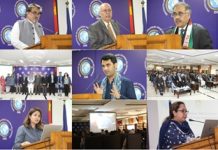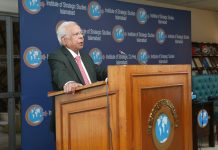
Dear Ambassador Khalid Mahmood, Chairman Institute of Strategic Studies, Excellencies, Ladies and Gentlemen!
It is indeed my pleasure to speak to you today on the important subject of Indus Waters Treaty. I am really grateful to the Institute of Strategic Studies for inviting me to initiate discussion on a subject which is very close to my heart. I strongly believe that healthy debate on issues of national importance plays a key role in defining and reshaping our political narrative. I also appreciate the efforts by ISSI to draw attention to the current pressing challenges, to assess them and find policy options to handle them.
Ladies and Gentlemen,
With the advent of 21st century, the rapid global economic expansion and technological innovation has led to intensive struggle, between nations, for the natural resources, of which water is the most important. Water security is the most serious concern and is emerging as the key national security issue. The tensions over access to water, within and between countries, in the region are growing and are increasingly securitized. The issue seems even more complicated, when regional and bilateral rivalries are taken into account. Additionally, the changing patterns of precipitation, as a result of climate change, exacerbate the scale of challenges before us.
Ladies and Gentlemen,
As you would know that at the time of partition of India, boundary between India and Pakistan was cut through the Indus Valley, and the forceful attempt by India to annex the State of Jammu and Kashmir further complicated the situation. The Indus basin irrigation system remains one of the world’s largest irrigation system. With Pakistan being the downstream riparian on Indus and all of its tributaries, the problem of water distribution was transformed into bilateral dispute with India and became a major conflict between the two newly independent countries. It was resolved after the conclusion of the Indus Waters Treaty between both the countries in September, 1960 with the World Bank as a signatory inter-alia for the dispute settlement provisions.
Ladies and Gentlemen,
Since its inception, the Indus Waters Treaty has stood the test of major wars and crises between Pakistan and India. It was again at the centre of attention when India endeavoured to circumvent the dispute resolution mechanism to which Pakistan resorted for resolution of outstanding disputes concerning design parameters of Kishenganga and Ratle hydro-electric plants as well as provisions of general applicability for all future run-of-river hydroelectric projects on the Western Rivers. Besides delay in arranging or participating in the meetings of the Permanent Indus Commission, India has also been denying the tours of inspection asked by Pakistan to be arranged on prompt basis as given in the Treaty. These actions by India represent non-cooperation towards implementation of the treaty, which is against the objectives of the Treaty as outlined in its Preamble.
We are well aware that India is pursuing a long term plan of constructing a number of run-of-river hydropower and storage projects that will potentially impact the natural pattern as well as quantity of flow of the Western Rivers if the construction and operation are not done according to the design and operational criteria expressly given in the treaty. We have conveyed our strong reservations on the designs and technical aspects of such infrastructures and hope that India would review and reconsider its stance which presents a direct threat to the Pakistan’s right of receiving flows of the Western Rivers without interference except for the restricted uses permitted to India for which conditions have been clearly specified in the Treaty. Such indifference to the obligations specified in the Treaty would adversely affect Pakistan’s agricultural, hydropower and environmental uses. We sincerely believe that New Delhi is not fulfilling its share of responsibilities under the Indus Waters Treaty.
Ladies and Gentlemen,
Pakistan considers the Indus Waters Treaty of 1960 as a document which was concluded after protracted negotiations between the parties over several years and which entails substantive provisions that clearly fix and delimit the rights and obligations of both India and Pakistan, that embody a bargain that was agreed to by both the Parties, therefore any modifications or changes to the provisions of the Indus Waters Treaty of 1960 will neither be desirable nor acceptable. We perceive that the Indian attempts are a serious digression from the fundamental principles agreed in the Treaty.
Pakistan, on its part, has always demonstrated readiness and willingness to resolve all water disputes within the framework of the Treaty. Our position is based on the principles enshrined in the Treaty which must be honoured in letter and spirit.
In the present dispute on Kishenganga and Ratle hydroelectric plants of India, Pakistan urges and shall continue to urge the World Bank to fulfil its commitments with regards to the Treaty. Since the World Bank is a signatory to the Treaty, it should play its due constructive role to help resolve. the water, issues between India and Pakistan and this will pave the path to ensure the peace in the region.
Ladies and Gentlemen,
In conclusion, I would reiterate that Pakistan will stand with the principles and the law. Pakistan emphasizes that our neighbour should also honour tenets of the Indus Waters Treaty.
There is no escaping from the fact that Pakistan and India share and occupy the same geo-strategic space. It is important to recognise that bilateral cooperation on equitable access to strategic asset of Indus waters is crucial for maintaining the peace and stability in the region. The hegemonic attitude as depicted by India in the present dispute is neither constructive nor would it serve the interests of both the countries.
Thank You Very Much.
*****














